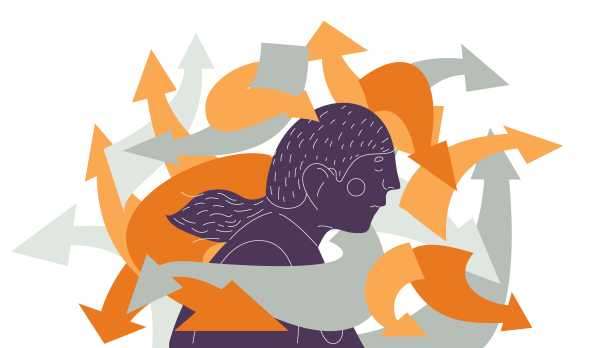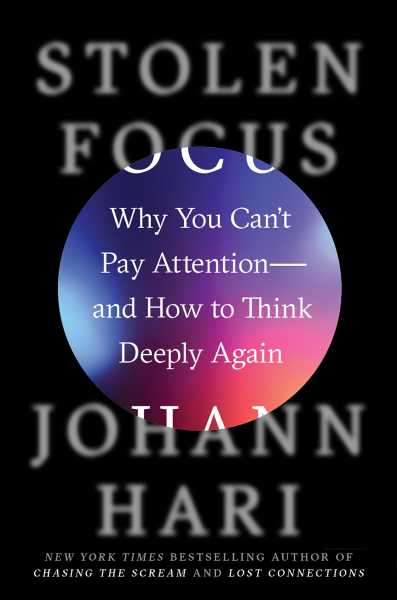
We live in a distracted world, almost certainly the most distracted world in human history. And if you’re part of this circus, you’re drowning in options and gadgets and screens and you’re being pulled in a million directions seemingly all at once.
If you spend any time online, you already know this. You’re constantly stalked by advertisers and product peddlers, and your attention is constantly being harvested and sold. That’s the business model of Big Tech.
A new book by the British journalist Johann Hari, called Stolen Focus, takes a close look at what’s happening — and what’s happened — to our collective attention. Hari argues that we’re all becoming lost in our own lives, which feel more and more like a parade of diversions. And it seems to be getting worse and worse every year.
Hari’s book isn’t exactly a blueprint for escaping all of this, and to the extent that it is, I’m skeptical. But it does point to a problem that we probably don’t take seriously enough. So I reached out to him for the latest episode of Vox Conversations. We discuss what happened to our attention, who he thinks stole it, and why our collective distraction is a genuine crisis.
Below is an excerpt, edited for length and clarity. As always, there’s much more in the full podcast, so subscribe to Vox Conversations on Apple Podcasts, Google Podcasts, Spotify, Stitcher, or wherever you listen to podcasts.
Sean Illing
You’ve said every book of yours is an attempt to unpack a mystery. What’s the mystery here?
Johann Hari
I noticed that with each year that passed, it felt like my own attention was getting worse. It felt like things that require a deep focus, like reading a book, or watching long films, were getting more and more like running up and down an escalator. I could do them, but they were getting harder and harder. And I felt like I could see this happening to most of the people I knew. I felt like it was particularly bad for some of the young people in my life, a lot of whom seemed to be worrying at the speed of Snapchat.
For a long time, I told myself, “Well, every generation struggles with attention.” You can read letters from monks 1,000 years ago where one of them says to the other, “My attention isn’t what it used to be.” It’s just that you’re getting older, and as you get older, your mind deteriorates and you mistake your own deterioration for the deterioration of the world.
But I came to believe that we really are in a quite serious attention crisis, one that helps us to understand a lot of problems we’re facing, both as individuals and collectively. We need to understand that our attention did not collapse, our attention has been stolen from us by these very big forces. And that requires us to think very differently about our attention problems.
Sean Illing
And to the extent that you’re right, why is the assault on our attention a genuine crisis?
Johann Hari
Think about anything you’ve ever achieved in your life, whether it’s setting up a business, learning to play the guitar, being a good parent. That thing that you are proud of required a huge amount of sustained focus and attention. And when attention and focus break down — and I think there’s persuasive evidence they are breaking down — your ability to achieve your goals breaks down and your ability to solve your problems is significantly diminished.
My book is about attention at two levels. One is individual attention. All those things I just said are true of individual attention. It’s also true of collective attention: A society that can’t pay attention to problems together, that consists of people who are interacting primarily through mechanisms that make them angry, is a society that can’t solve its crises.
How old are you, Sean?
Sean Illing
Almost 40 (yikes!).
Johann Hari
So you’re three years younger than me. I’ve been thinking a lot about the ozone layer crisis. It’s one of my earliest political memories. For younger listeners who don’t know, the planet is protected by a layer of ozone that keeps us safe from the sun’s rays. And when I was a kid, it was discovered that we were releasing a chemical in hairsprays and fridges called CFCs that were damaging the ozone layer.
Look, I’m not nostalgic about the ’80s. Lots of things were wrong with the politics of the ’80s. But think about what happened here. The science was explained to ordinary people. They listened, they distinguished it from lies and conspiracy theories, and ordinary people banded together and pressured their politicians to act. And even quite unlikely politicians who were very hostile to government regulation, like Margaret Thatcher and George Bush Sr., came together. And as a result, the ozone layer is now healing. I feel absolutely confident that would not happen now if the ozone layer crisis happened.
I think you would get some people who would wear ozone layer badges, you would get other people who would film themselves spraying CFCs into the atmosphere to own the libs and make them cry. You would get people saying, “How do we even know the ozone layer exists? Maybe George Soros made the hole in the ozone layer.” We would become lost. We would not be able to summon the collective attention.
Sean Illing
I’m glad you went there because I think on the individual level, it’s easier to see the cost of losing control of our attention, but I do think there’s a buried political cost. What we’re talking about here is the manufacturing of mass distraction. And that to me is just another way of manufacturing mass consent, but it’s a passive consent that comes from a population that’s too divided and diverted to mobilize in defense of anything — and that’s a big problem.
Johann Hari
I think that’s a brilliant way of putting it. I would say it’s even worse. It’s not that they can’t mobilize in defense of anything. Actually, they often end up being mobilized absolutely sincerely in crazy causes, in absolutely mad delusions, like the QAnon conspiracy theory.
Sean Illing
Why do you suppose that is?
Johann Hari
It’s interesting — when I started working on the book, and I said to people, “I’m thinking of writing a book about attention and focus,” people said to me, “Oh, so you’re writing a book about smartphones.” And what struck me actually in the research is there are aspects of our technology that are profoundly damaging our ability to focus that can be fixed. This is not inherent to the tech itself.
I spent a lot of time in Silicon Valley interviewing some of the leading dissidents there, people who designed key aspects of the world in which we now live. And some aspects of the individual attention component in this are now becoming well understood. It’s important to say, though, that the way big tech wants us to frame this debate is, are you pro-tech or anti-tech? And that framing induces fatalism because we’re not going to give up our technology.
The real question is, what kind of tech do we want and whose interests should it serve?

Sean Illing
So the problem isn’t the tech, it’s the business model?
Johann Hari
The heart of this is the business model. So you open Facebook or any of the mainstream social media apps and those companies begin to make money immediately in two ways. The first way is obvious. You see ads and they make money from the ads.
The second way is much more important. Everything you do on Facebook is scanned and sorted by Facebook to build a profile of you. So let’s say that you like Donald Trump and you tell your mom you just bought some diapers. Facebook’s algorithms are scanning you. This is someone who likes Donald Trump, he’s probably conservative. And he’s talking about diapers, he’s got a baby. They build up a profile of you to sell to advertisers. As people in Silicon Valley always say, you are not the customer of Facebook, you’re the product they sell to the advertisers.
The whole machinery, this whole business model has an effect: Every time you pick up Facebook and scroll, they make money. And every time you put it down, their revenue streams disappear. So all of their algorithmic power, all of their engineering genius, some of the cleverest people in the world are dedicated toward one goal: “How do I get Sean to pick up his phone more often and scroll as long as he possibly can?”
Sean Illing
In the book, you acknowledge the incompleteness of the evidence here, even writing that “We don’t have any long-term studies tracking these changes in people’s ability to focus over time.” So I have to ask, how much of this is anecdotal and speculative and how much of it is empirical and data-driven?
Johann Hari
It’s a really important question and one that I grapple with throughout the book. There are two ways that I think we could reasonably reach the conclusion that we’re in an attention crisis.
The ideal way would be if somebody 200 years ago, even a century ago, had begun to administer attention tests to ordinary people and did every year since. That would be perfect evidence. We would have a very high degree of confidence, in the same way that we know that IQ tests have been administered in pretty similar ways for more than a century. No one did that. The data wasn’t gathered, so we can’t draw our conclusions that way.
But I think there are reasonable ways we can infer from other substantial bodies of evidence. So let’s look at something specific like sleep. There is overwhelming scientific evidence that if you sleep less, your attention will get worse. If you stay awake for 19 hours, your attention will be as bad as if you were legally drunk. The evidence for that couldn’t be more overwhelming.
We also have pretty good evidence, although there isn’t a consensus, that we sleep significantly less than we used to. Only 15 percent of Americans wake up feeling refreshed. The figures for the US are staggering. I go through them in the book for the lack of sleep in the United States. I think the figure, if I remember rightly, is something like 37 percent of Americans sleep less than seven hours a night. When I spoke to Dr. Charles Czeisler, who’s one of the leading experts in the world on sleep at Harvard Medical School, he said even if that was the only change that had happened, that we sleep so much less, that alone would cause a really significant attention crisis.
And these changes interact with other changes. If you have a night where you sleep six hours, you’re going to be more inclined to just scroll and scroll the next day, so it leaves you more vulnerable to these invasive technologies.
Sean Illing
Going back to the tech part of this, there’s a circularity here that’s deeply depressing to me. The tech industry feeds on our distracted condition. And that means the content it produces is increasingly designed for a distracted population. And the more we consume this content, the more attention-seeking and clickbait-y it gets. And therefore the more attention seeking and clickbait-y our minds get.
I’ve heard you mention the Canadian media theorist Marshall McLuhan before. He coined this phrase, “The medium is the message.” The basic point was that we start to resemble our dominant tools of communication. We learn about the world through the TV and we start to think like the TV, we start to see the world through the eyes of TV. We learn about the world through the internet and we start to think and communicate like the internet.
And all these human activities that play out on these platforms start to resemble them, too. The way we do politics now has become a reflection of TV and the internet and the commercial incentives that drive it. Politicians now compete to capture our attention and they have to behave in increasingly ridiculous ways to do that because that’s how you get attention in this marketplace shaped by these technologies. So it just feels like a doom loop that we’re just spinning around in like a hamster in a wheel.
Johann Hari
I think you put that brilliantly. The only word I would disagree with is “doom loop,” because there’s a way out of that. I learned about this initially from Jaron Lanier, a brilliant tech dissident, and indeed a brilliant technologist. He used to be an advisor on a lot of dystopian movies, like Minority Report. And he said, “I’ve stopped doing it because I would design these horrific dystopian technologies to warn about the future, and then all these tech people would watch it and go, ‘That’s really cool. We have to invent that.’”
And he’s like, “No, no, no, that’s not what I meant.” He helped me see a useful parallel. It used to be common for people to paint their homes with lead paint and to put leaded gasoline in their cars. I remember my mother putting leaded gasoline in her car. And it had been known, actually going all the way back to ancient Rome, that exposure to lead is really bad for you.
By the ’70s, the evidence was so clear that there began to be movements of ordinary citizens. It was mostly mothers saying, “Look, this is really damaging our children’s brains. We won’t allow it.” Now, it’s really important to notice what they didn’t do. They didn’t say, “Let’s ban gasoline.” They didn’t say, “Let’s ban paint.” They said, “Let’s ban leaded paint and leaded gasoline.”
We can deal with social media through regulation. I remember Aza Raskin, who invented a key part of how the internet works — his dad, Jef Raskin, actually invented the Apple Macintosh for Steve Jobs — I remember Aza saying to me, “The first step of the solution is really simple: we need to ban the current business model,” what Professor Shoshana Zuboff brilliantly called “surveillance capitalism.”
We need to just say that a business model premised upon discovering the weaknesses in your attention in order to hack it and sell it to the highest bidder is fundamentally immoral and inhuman like leaded paint, and we will not allow it.
Sean Illing
What would replace it?
Johann Hari
I remember saying to Aza and many of the other people who argue this to me, “Okay. But let’s imagine we do that, what happens the next day when I open Facebook, does it just say, ‘Sorry guys, we’ve gone fishing”? And they said, “Of course not.” What would happen is they would move to a different business model. And we all have experience of two possible alternative business models. One is subscription and everyone knows how platforms like Netflix and HBO work.
Another model that everyone can understand is something like the sewer system. Before we had sewers, we had shit in the streets, we had cholera. So we all paid to build the sewers and we all own the sewers together. I own the sewers in London and Las Vegas, you own the sewers in the city where you live. So just as we all own the sewage pipes together, we might want to own the information pipes together, because we are getting the attentional equivalent of cholera and the political equivalent of cholera.
But whatever alternative model we adopt, the crucial thing is to understand in this different model, your attention is no longer the product they sell to the real customer, the advertiser. Suddenly, you are the customer.
In that world, Facebook and other social media companies have to ask, “What does Sean want?” Oh, Sean wants to be able to pay attention. Let’s design our app not to maximally hack and invade his attention and ruin it, but to help him heal his attention. “Oh, Sean wants to be able to meet up with his friends offline — let’s design our app to facilitate him meeting up with people online instead of endlessly arguing with people about bullshit.” I would argue that we need an attention movement to reclaim our attention and focus. And it requires a shift in perspective. When I couldn’t focus and pay attention, I would blame myself. I’d say, “Oh, you’re weak. You’re lacking in willpower.” We need to stop doing that. This is being done to all of us.
It’s like we’re having itching powder dumped on us all day and then we’re being told, “You know what, buddy, you might want to learn how to meditate, then you wouldn’t scratch so much.” We need to get out of this psychology and remind ourselves that we’re not medieval peasants begging at the court of King Zuckerberg for a few little crumbs from his table.
To hear the rest of the conversation, click here, and be sure to subscribe to Vox Conversations on Apple Podcasts, Google Podcasts, Spotify, Stitcher, or wherever you listen to podcasts.
Will you support Vox’s explanatory journalism?
Millions turn to Vox to understand what’s happening in the news. Our mission has never been more vital than it is in this moment: to empower through understanding. Financial contributions from our readers are a critical part of supporting our resource-intensive work and help us keep our journalism free for all. Please consider making a contribution to Vox today.
Sourse: vox.com






